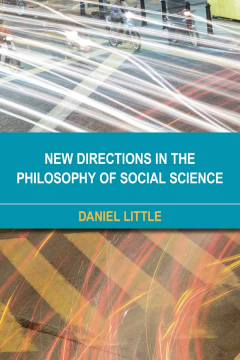
Additional Information
Book Details
Abstract
Philosophy matters for the social sciences. Our world faces ever more complex and hazardous problems and, social science ontology and methods need to be adequate to the changing nature of the social realm. Imagination and new ways of thinking are crucial to the social sciences.
Based on Daniel Little's popular blog, this book provides an accessible introduction to the latest developments and debates in the philosophy of social science. Each chapter addresses a leading issue in the philosophy of the social sciences today. Little advocates for an 'actor-centred sociology', endorsing the idea of meso-level causation and proposing a solution to the problem of 'mechanisms or powers?'. The book draws significant conclusions from the facts of complexity and heterogeneity in the social world. The book develops a series of arguments that serve to provide a new framework for the philosophy of social science through deep engagement with social scientists and philosophers in the field. Topics covered include:
- the heterogeneity and plasticity of the social world;
- the complexity of social causation;
- the nuts and bolts of causal mechanisms;
- the applicability of the theory of causal powers to the social world;
- the intellectual coherence of the perspective of scientific realism in application to social science.
Daniel Little is a master of synthesis. Where others build barriers between philosophical traditions, he looks for the value in each and how to combine them fruitfully. This book brings together cutting edge ideas from all the most influential contemporary philosophies of the social sciences. Packed with stimulating and accessible debates, it will immediately become a core text.
Dave Elder-Vass, Reader in Sociology, Loughborough University
Long the most careful observer of social science among analytical philosophers, Dan Little actually reads what we social scientists say. His new book is thus the most up-to-date and best informed treatment of social science from the ranks of analytical philosophy. That quality makes New Directions in the Philosophy of Social Science required reading for both social scientists and philosophers.
Douglas Porpora, Professor of Sociology, Drexel University
New Directions in the Philosophy of Social Science contains many interesting ideas, which Little presents in an engaging way, and is a welcome addition to the literature.
Before he coined the Latin and Greek hybrid term “sociology” for his new science, Auguste Comte used the label “social physics.” In contrast, Little (philosophy and sociology, Univ. of Michigan) argues that “sociology is not like physics.” And what he says about sociology applies to other social sciences, from ethnography to economics. Social scientists who search for general theories a la physics demonstrate a failure to understand several critical aspects of social phenomena: heterogeneity, causal complexity, contingency, path dependency, and plasticity. Little calls for the use of “methodological localism,” in which institutions and organizations (meso-level) provide the grounding for an understanding of the meaning of actor behavior (micro-level). Finally, he supports Robert K. Merton’s call for middle-range theories... Little’s ability to explore basic issues from philosophy with contemporary examples from various social sciences will make this work a valued source for social scientists, and philosophers will gain insight into the applicability of their concepts to the work of practicing contemporary social scientists. Summing Up: Highly recommended. Graduate students and faculty in the philosophy of social science and in the social sciences.
Daniel Little is Chancellor and Professor of Philosophy at the University of Michigan-Dearborn and Professor of Sociology at the University of Michigan-Ann Arbor. His many publications include New Contributions to the Philosophy of History (2010), The Paradox of Wealth and Poverty (2003), and Microfoundations, Method, and Causation: Essays in the Philosophy of the Social Sciences (1998).
